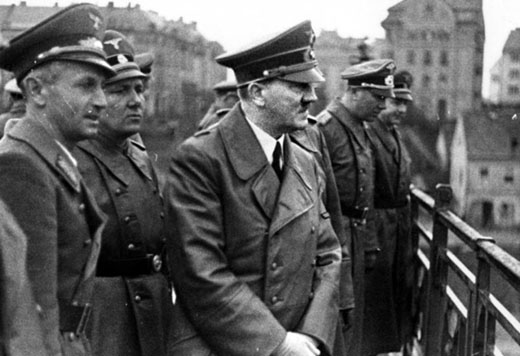Balkans, Politics
Hitler Dealing with Yugoslavia |
 |
The Yugoslav Prime Minister Dragisa Cvetkovic and the Foreign Minister Aleksander Cincar-Markovic sign the Tripartite Pact in Vienna in the presence of Hitler, Ribbentrop and Gen Oshiona (the Japanese Ambassador in Berlin). The reality of the situation and the influence of German pressure is made only too clear by the cold tone of the occasion. A refusal to sign the agreement would have let to war with Germany. Yugoslavia has no allies, and her armed forces are in a poor state compared with those of the Wehrmacht.
To buy time, the government had proposed the substitution of a simple non-aggression pact instead of the Tripartite Pact. Berlin, however, remained adamant, insisting on outright Yugoslav adherence to the Axis camp. Som concessions were offered. For example, when objections were made to Article III of the treaty, which might have obligated Yugoslavia to fight the United States or perhaps even the Soviet Union, the Germans agreed not to insist upon this stipulation. Also, Germany agrees to respect Yugoslav sovereignty and not to demand passage for troops earmarked for the invasion of Greece. Protests take place in Belgrade when the agreement is known.
[Battle of the Atlantic
The British steamer Rossmore (627t) is sunk by German bombing 12 miles northeast of Godrevy Island with the loss of 6 crewmen. A German air attack also sinks the British steamer Beaverbrae (9956t) southwest of the Faroe Islands. The entire crew of 86 is picked up by the British destroyers Tartar and Gurkha.
[German Raiders
- The British steamer Britannia (8799t) is sunk by the German raider Thor south of the Cape Verde Islands. 249 passengers and crew are lost. The Spanish steamer Bachi rescues 51 survivors, the Spanish steamer Cabo de Hornos rescues 77 survivors, and the British steamer Raranga rescues 67. 33 survivors reach Brazil in a lifeboat after 23 days. The Thor next sinks the Swedish steamer Trolleholm (5074t) in the South Atlantic. The crew is picked up and interned.
- The British steamer Canadolite (11,309t) is captured by the German raider Kormoran in the South Atlantic.
Italian East Africa
The 5th Indian Div renews its advance toward the Italian blocking position on the Keren road.
[North Africa
Marshal Graziani, C-in-C of the Italian Armies in Libya and Chief of the General Staff, retires at his own request.
[